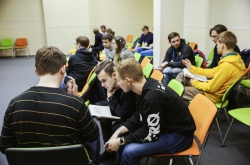Roman Vakhrushev and Yulia Goldina, the project’s authors, came to ITMO’s Business Incubator after the EdHack AR/VR hackathon that took place last September in Moscow. During this two-day event, they developed the initial concept and a lesson prototype. As of now, the team already has a demo.
“We use VR to teach practical skills - those that would call for one’s personal presence if studied at a university. It is possible to interact with our program using eye movement, and soon we’ll add gestures, meaning that users do not just watch a video on the internet, but can perform actions that are essential for their training. In other words, this can act as a replacement of intramural education,” explains Roman Vakhrushev.
The project’s unique feature is that it does not require expensive equipment - only a smartphone and cardboard VR headset. By the way, foreign counterparts (VR Class and RedBoxVR projects, for instance) mostly use their native hardware, the headsets costing around 150 USD, while cardboard VR headsets cost around 5 USD and can be found at almost any hardware store.

The Horum online-service works via a mobile app. Once a user downloads it, they can choose a lesson, put on a VR headset, and the interaction begins. The demo of the first lesson is already available for any smartphone released after 2012; the app also “supports” laboratory work, tests, and other educational formats. Initially, the developers planned to create a service for holding online interviews, conferences and presentations, but they decided to shift their focus to the field of education, where their product is more relevant. During a crash course at Future Technologies, they developed a demo and found people who will develop the web-platform and create 3D models for the project. By the program’s end in mid-March, they plan to have a working business model and sell their first lessons.
The educational content is created by the team on their own - besides technical specialists, it includes lecturers who write scenarios and consult the developers. Horum’s users will be offered lessons on both technical and non-technical sciences; for instance, the already existing demo is an interdisciplinary lesson that takes the student to the ancient city of Pompeii and provides information about the volcano that destroyed it. Though the length of each lesson will not exceed eight minutes, creating one will take from one week to two months – depending on its complexity.
The team is currently conducting negotiations with schools and universities of St. Petersburg and Moscow; for instance, the developers are discussing the possibility of introducing their invention at ITMO University. In this case, it can be used for the Information Literacy course that is mandatory for all first-year Bachelor’s students; VR lessons will serve as short summaries of the basic lectures.

“Today our project has several foreign counterparts that we took inspiration from. For instance, there’s VR Speech - an English VR project on training public speaking skills; there are also projects offering corporate training for companies, and the like. Russia’s education market is rapidly growing, especially everything related to online education, but no one tries anything similar in the field of VR. We want to become pioneers and be the first to launch VR educational courses in Russia. Our main problem has to do with selling the product to schools and universities, as their budget does not account for such expenses. VR is seen as something expensive due to the high prices on headsets. In our case, the universities only have to pay for the development of lessons, as students can afford the headsets themselves. For now, we are aiming at collaborating with state institutions like universities. We also consider working with private schools and technoparks, though I have to admit that schools are not as open to innovation projects as universities are,” comments Yulia Goldina.




